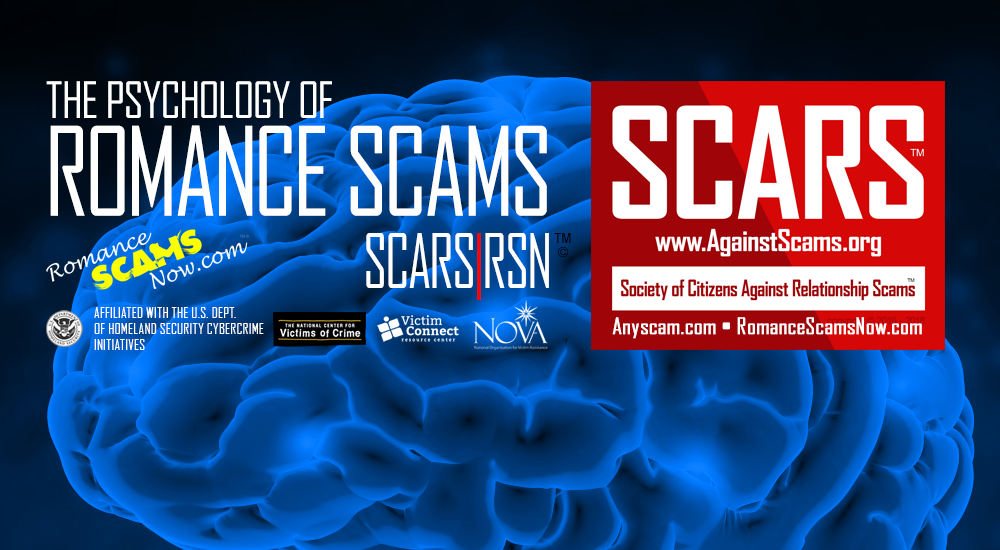SCARS™ Subject Focus: The Psychology Of Romance Scams
Romance Scams Are Infinitely Complex And Leave Victims With Significant Trauma
Attention is like a spotlight, which means when it’s pointing in one direction it pretty much ignores everything else. This is how a Romance Scam starts!
Except people don’t realize how little information coming in from the outside world we actually process. Naturally, you don’t notice what you don’t notice, plus the mind is designed to fill in the gaps for us. But fraudsters do know and almost every con uses some kind of distraction – a kind of social engineering to get you to do what the scammer wants you to do.
Scammers know all about social compliance and happily exploit our automatic deference to authority figures such as soldiers. People will hand over credit cards to people they think are waiters, car keys to people they think are car park attendants and give access to their house to people they think are from the water board. The best known online example is a ‘phishing attack’ where people give fraudsters their bank details in response to an email that purports to be from their bank.
These are just the tip of the iceberg when it comes to social engineering scams. To truly learn how victims are manipulated and all of the mechanisms involved, we invite you to read our SCARS Library (below) on the subject of the Psychology of Romance Scams!

SCARS™ Team
A SCARS Division
Miami Florida U.S.A.
TAGS: Psychology of Scams, Romance Scams, Social Compliance, Amygdala Hijack, Gaslighting, Stranger Trust, Trauma Bonding, PTSD, Victim Syndrome, Complex, Syndromes, Victimization,
END
– – –
Tell us about your experiences with Romance Scammers in our Scams Discussion Forum on Facebook »
– – –
FAQ: How Do You Properly Report Scammers?
It is essential that law enforcement knows about scams & scammers, even though there is nothing (in most cases) that they can do.
Always report scams involving money lost or where you received money to:
- Local Police – ask them to take an “informational” police report – say you need it for your insurance
- Your National Police or FBI (www.IC3.gov)
- The SCARS|CDN™ Cybercriminal Data Network – Worldwide Reporting Network HERE or on www.Anyscam.com
This helps your government understand the problem, and allows law enforcement to add scammers on watch lists worldwide.
– – –
Visit our NEW Main SCARS Facebook page for much more information about scams and online crime: www.facebook.com/SCARS.News.And.Information
To learn more about SCARS visit www.AgainstScams.org
Please be sure to report all scammers HERE or on www.Anyscam.com
All original content is Copyright © 1991 – 2020 SCARS All Rights Reserved Worldwide & Webwide – RSN/Romance Scams Now & SCARS/Society of Citizens Against Relationship Scams are all trademarks of Society of Citizens Against Relationship Scams Incorporated (formerly the Society of Citizens Against Romance Scams)
Legal Notices:
All original content is Copyright © 1991 – 2020 SCARS All Rights Reserved Worldwide & Webwide. Third-party copyrights acknowledge.
SCARS, RSN, Romance Scams Now, SCARS|GLOBAL, SCARS, Society of Citizens Against Relationship Scams, Society of Citizens Against Romance Scams, SCARS|ANYSCAM, Project Anyscam, Anyscam, SCARS|GOFCH, GOFCH, SCARS|CHINA, SCARS|CDN, SCARS Cybercriminal Data Network, Cobalt Alert, Scam Victims Support Group, are all trademarks of Society of Citizens Against Relationship Scams Incorporated.
Contact the law firm for the Society of Citizens Against Relationship Scams Incorporated by email at legal@AgainstScams.org







Please Leave A Comment - Tell Us What You Think About This!